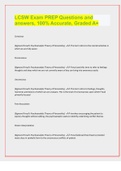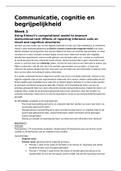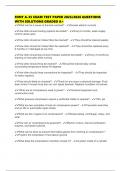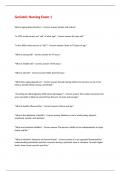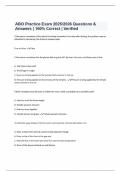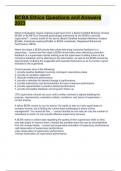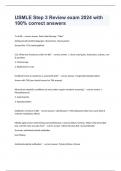What the macro/micro effects of a government raising the minimum wage
A minimum wage is the lowest wage employers can hire a worker for, above equilibrium wage, the
current minimum wage for those over 25 in the UK is £8.21. Reasons a government may set a
minimum wage is to increase the wage of the lower paid and therefore decrease the income
inequality gap. Whilst these are positive effects a minimum wage can also have unintended
consequences since it raises a firms costs which can lead to unemployment, a fall in efficiency and a
decrease in export competitiveness. Ultimately in most cases a minimum wage benefits the lowest
earning workers who keep their jobs however, it tends to disadvantages the few who are made
redundant as well as the firms whose costs have now increase.
Firstly, a rise of the minimum wage in the labour market will mean that demand for labour will
decrease (as seen on the diagram) and the supply of labour will increase (as seen on the diagram).
Demand for labour will fall because a rise in the minimum wage means that the firms ATC will rise
since they will have to pay for the increased wage of their workers. Supply of labour on the other
hand will increase because workers will be more incentivised to join the market since if they get a
job they will now receive a higher income as the wage has now been raised. Both the fall in demand
for labour and the increase in supply of labour will lead to an increase in unemployment since there
will be an excess supply of labour meaning people will not be able to enter the labour market. As
well as many firms may not be able to cover the costs of increased wages and so will have to lay off
existing employees, this is particularly true for low skilled workers such as those employed in retail,
child care and hospitality. Those who are now unemployed will have to apply for benefits and if
benefits are lower than their previous wage their standards of living will fall since they can no
longer afford as many goods and services. Therefore, a rise in the minimum wage can have
unintended consequences such as unemployment which can seriously disadvantage those who
become unemployed or cannot get a job due to the decrease demand of labour and excess supply.
However, the effect of this is completely dependent
on how much the minimum wage raises by because
if it only raises by a small percent there will be little
effect on the labour market and therefore
unemployment may not be effected. Reports from
the low pay commission have said that a rise in the
national minimum wage has only ‘modestly’
increased the risk of job losses claiming that a £1
increase in the minimum wage led to a 0.24 and
0.15 per cent decline in the share of jobs which
meant that only 45,000 people in total could be
affected. Furthermore workers who are in a job
where demand for labour is inelastic will not be
effected such as those in highly skilled jobs like neurology since their job requires high skills/
training and so demand for labour will be unresponsive to a rise in wage. Moreover, those who keep
their job will benefit from the rise in the minimum wage since their income will increase which is
the intention of the policy and therefore workers will have more disposable income to spend on
goods and services. This decrease workers income inequality and therefore their standards of living
will rise. Whilst this is true some firms may still experience the ratchet effect whereby a minimum
wage rise will mean workers who are not on the minimum wage but just above will ask for higher
wages. This will have a knock on effect throughout the firm which can lead to a fall in productivity
as workers are demotivated and so the firm might have to lay off more workers since their MRP has
decreased, which will further increase unemployment. However, lots of firms are able to resist this
and so whilst a rise in the minimum wage can have negative impacts particularly for those who are
A minimum wage is the lowest wage employers can hire a worker for, above equilibrium wage, the
current minimum wage for those over 25 in the UK is £8.21. Reasons a government may set a
minimum wage is to increase the wage of the lower paid and therefore decrease the income
inequality gap. Whilst these are positive effects a minimum wage can also have unintended
consequences since it raises a firms costs which can lead to unemployment, a fall in efficiency and a
decrease in export competitiveness. Ultimately in most cases a minimum wage benefits the lowest
earning workers who keep their jobs however, it tends to disadvantages the few who are made
redundant as well as the firms whose costs have now increase.
Firstly, a rise of the minimum wage in the labour market will mean that demand for labour will
decrease (as seen on the diagram) and the supply of labour will increase (as seen on the diagram).
Demand for labour will fall because a rise in the minimum wage means that the firms ATC will rise
since they will have to pay for the increased wage of their workers. Supply of labour on the other
hand will increase because workers will be more incentivised to join the market since if they get a
job they will now receive a higher income as the wage has now been raised. Both the fall in demand
for labour and the increase in supply of labour will lead to an increase in unemployment since there
will be an excess supply of labour meaning people will not be able to enter the labour market. As
well as many firms may not be able to cover the costs of increased wages and so will have to lay off
existing employees, this is particularly true for low skilled workers such as those employed in retail,
child care and hospitality. Those who are now unemployed will have to apply for benefits and if
benefits are lower than their previous wage their standards of living will fall since they can no
longer afford as many goods and services. Therefore, a rise in the minimum wage can have
unintended consequences such as unemployment which can seriously disadvantage those who
become unemployed or cannot get a job due to the decrease demand of labour and excess supply.
However, the effect of this is completely dependent
on how much the minimum wage raises by because
if it only raises by a small percent there will be little
effect on the labour market and therefore
unemployment may not be effected. Reports from
the low pay commission have said that a rise in the
national minimum wage has only ‘modestly’
increased the risk of job losses claiming that a £1
increase in the minimum wage led to a 0.24 and
0.15 per cent decline in the share of jobs which
meant that only 45,000 people in total could be
affected. Furthermore workers who are in a job
where demand for labour is inelastic will not be
effected such as those in highly skilled jobs like neurology since their job requires high skills/
training and so demand for labour will be unresponsive to a rise in wage. Moreover, those who keep
their job will benefit from the rise in the minimum wage since their income will increase which is
the intention of the policy and therefore workers will have more disposable income to spend on
goods and services. This decrease workers income inequality and therefore their standards of living
will rise. Whilst this is true some firms may still experience the ratchet effect whereby a minimum
wage rise will mean workers who are not on the minimum wage but just above will ask for higher
wages. This will have a knock on effect throughout the firm which can lead to a fall in productivity
as workers are demotivated and so the firm might have to lay off more workers since their MRP has
decreased, which will further increase unemployment. However, lots of firms are able to resist this
and so whilst a rise in the minimum wage can have negative impacts particularly for those who are

